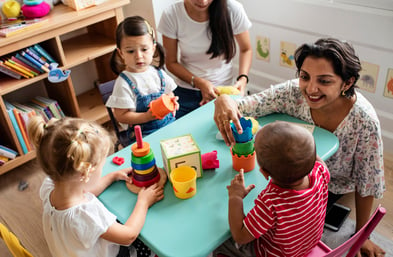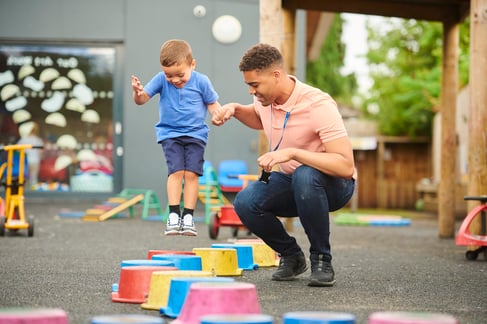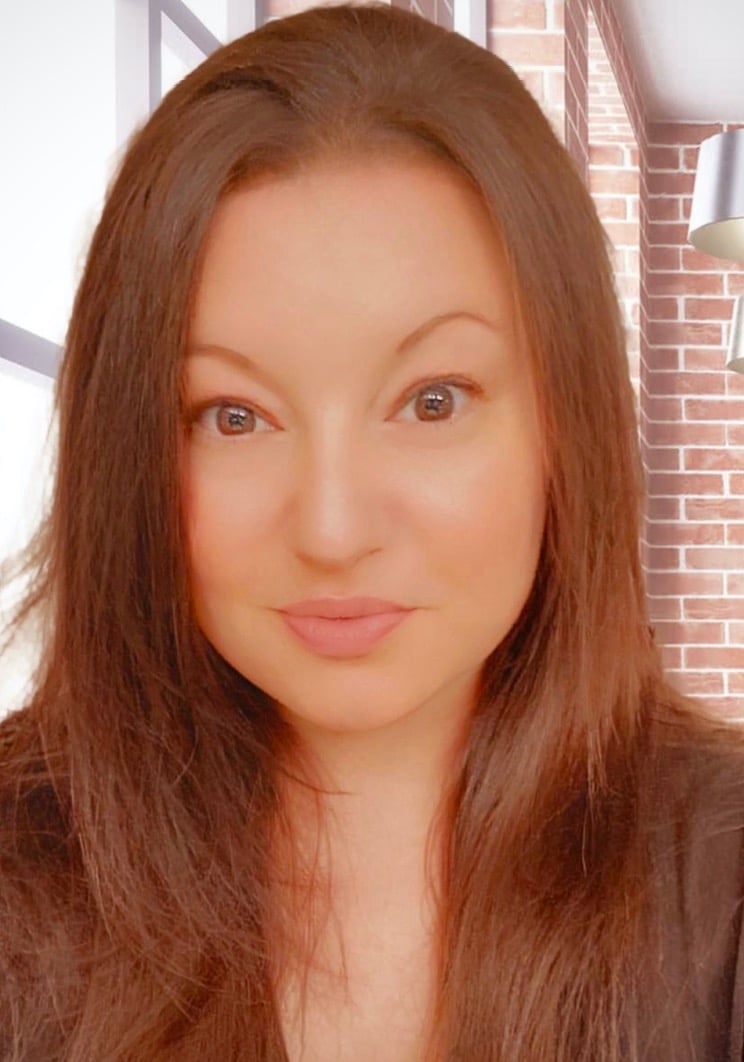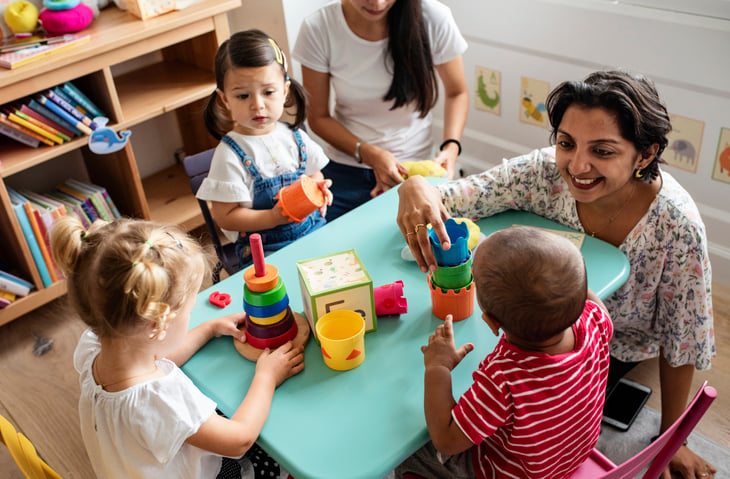How to Run a Special Needs Daycare
My path from teenage helper to “nanny share” to ABA therapist to opening my own Special Needs Daycare.
Special needs daycares provide a wonderful way to provide specialized support for your autistic child. Whether you want to go down this path yourself as a career option or want to find a special needs daycare for your autistic child, this article can help.
From Helper to Nanny
I can remember summers off in middle school when I was growing up in Upstate New York. I would go down the road to my Aunt Joanne’s in-home daycare for a few hours each day to help with the kids. She would pay me $2 an hour to play with them outside and help her through lunch. I felt so special thinking I had my very first job, and that it was such an important one. Years later I realize that it was most likely a way for my family to not only keep an eye on me while at work but also teach me a few lessons, such as responsibility. Either way, I loved it! Little did I know then, these few summers would shape the rest of my life!
 I first became a nanny in the year 2000 caring for my very first infant. Shortly after, I became a live-in nanny for the first time while attending nursing school to become a licensed practical nurse. In 2010, I moved to Las Vegas where I began to nanny for a set of premature twin infant boys. I stayed with the family for 2 years until they moved out of state. During this time, I also became a nanny to a sweet 3-year-old boy. I spent the next 8 years with this family as a live-in nanny helping them raise their 3 beautiful children full-time and traveling across the country.
I first became a nanny in the year 2000 caring for my very first infant. Shortly after, I became a live-in nanny for the first time while attending nursing school to become a licensed practical nurse. In 2010, I moved to Las Vegas where I began to nanny for a set of premature twin infant boys. I stayed with the family for 2 years until they moved out of state. During this time, I also became a nanny to a sweet 3-year-old boy. I spent the next 8 years with this family as a live-in nanny helping them raise their 3 beautiful children full-time and traveling across the country.
Running a Daycare for My Own Family and Transitioning to a Special Needs Daycare
In 2017, my niece was born, my little love! My family and I decided that I would provide her with daycare. This is when I decided to open a nanny-share where 2 or more families share a nanny and the cost of her salary. A nanny-share offers the socialization that you typically do not find with a private nanny, with the one-on-one attention and flexibility that is hard to come by at a daycare facility. It really can be the best of both worlds. During my time as a nanny-share, I cared for newborns and toddlers, ages 0-3.
The first little boy became a part of my nanny-share after my niece was an 11-week-old sweetheart with big beautiful blue eyes. Little did I know, my time with him would have a huge impact on my life! At 15 months old, we began to notice differences between him and the two other little ones in my care who were all around the same age. A few months later he went for his first evaluation, and not long afterward, the diagnoses began rolling in.
I did some training in child development and applied behavior analysis, and I began working with the children daily on learning new tasks, building vocabulary, balance, and motor skill development. While the other children did learn differently and most times faster, they provided a great opportunity for modeling and imitation, which helped this little guy thrive. In addition to the learning aspect, he was able to develop an emotional connection early on by spending so much time with the other children.
 My nanny-share had turned into a child development daycare with diagnoses such as autism spectrum disorder, social anxiety, fine motor delays, sensory processing disorder, and attention deficit hyperactivity disorder. My focus and passion for the children and the work I do provided me the opportunity to go back to school to further study Applied Behavior Analysis, or ABA Therapy, a more familiar term.
My nanny-share had turned into a child development daycare with diagnoses such as autism spectrum disorder, social anxiety, fine motor delays, sensory processing disorder, and attention deficit hyperactivity disorder. My focus and passion for the children and the work I do provided me the opportunity to go back to school to further study Applied Behavior Analysis, or ABA Therapy, a more familiar term.
Does your in-home daycare or nanny-share need to grow the way mine did or lead to graduate school? No. But let me tell you how it can help!
The Benefits of Running a Special Needs Daycare for Families of Autistic Children
Finances:
Autistic children often struggle with behavioral issues, which can make finding the right daycare difficult. The last thing you want to do is enroll your child in a program or center that does not offer the necessary support and vigilance. In addition, doctor appointments and therapy appointments can make it difficult to work full-time and care for your child. Oftentimes, both parents need to work, or a single parent needs to have income. Having an in-home daycare can provide you with income and allow you to explore some at-home therapy options.
Child Development Training:
Taking some training courses in child development and childcare can not only help market yourself to others and increase your income, but it can also help you work with your own child and provide an environment at home where the child can thrive.
Understanding Autism:
When our little guy first received his autism diagnosis, I took the 40-hour registered behavior technician training course because I knew very little about autism. This helped me understand the child, the diagnosis, and how I could help. I then began using social media platforms to help others.
Benefits for your child:
There are numerous benefits to having an in-home daycare. These daycares are smaller and more comfortable for children with developmental delays. They provide more opportunities for children with developmental diagnoses to learn, explore, and connect alongside their non-autistic peers. This type of situation may help your child feel more connected to you.

What to Look for in a Special Needs Daycare
Maybe you are not looking to start your own in-home daycare. However, you may be interested in finding an in-home daycare that is right for your child. The provider you chose should have training and/or credentials in child development, and training in behavior analysis or autism-specific courses is a plus. Do not be afraid to ask for proof and you may even offer to provide financial support if they would be willing to obtain additional training. I know a lot of daycare providers who would love the opportunity to enhance their skills and knowledge!

Marianne Coppola
Marianne Coppola, MHA, ABA works as a child development specialist with toddlers and pre-schoolers. She is passionate about early intervention and finding creative and engaging ways to help children reach developmental milestones. Her work extends to children diagnosed with Autism Spectrum Disorder, Attention Deficit Hyperactivity Disorder, Sensory Processing Disorder, Social Anxiety, and Motor Development Delays. She holds an M.A. in Healthcare Administration, and an M.A. in Special Education and Applied Behavior Analysis. She is currently studying to become a Board-Certified Behavior Analyst and is pursuing a PhD in Behavioral Health.






